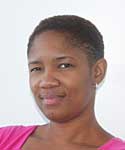
I am Visiting Assistant Professor of History and Africana Studies at Muhlenberg College, where I have a wonderful opportunity to engage students in discussions about the history of African Americans in the diaspora. This term I will be teaching Gender and Jim Crow and Race Reform and Revolution, a course that chronicles the evolution of African American political thought and activities since Emancipation. My course roster for the spring term is still to be determined but I hope that it will include African American religious history or my course on African American Diasporas of the 19th Century in which we explore the various sites of political and cultural connection African Americans created as fugitive slaves, missionaries and emigrants to Liberia and beyond.
I am particularly interested in the intersection between religion and power, a subject that shaped my research for many years. I am beginning revisions on my dissertation, “Faith and Freedom: The Politics of Black Religious Institutions in Post-emancipation Virginia,” in which I explore how black churches, conventions and seminaries shaped and were shaped by the transition to freedom. I describe how black religious institutions were important mediators of black political participation during the two decades following emancipation and how their roles and goals changed over this period, resulting in a hardening of gender roles. Consequently, this work charts the emergence of the “political pulpit,” as a predominantly male domain during the nineteenth century.
In my past teaching, I have emphasized on planning and preparation, perhaps to the neglect of outcomes and assessments. I always felt that having a clear lesson plan was key to a successful class session. I’m beginning to think that having clear goals will be more productive and will open the way for more flexibility and fluidity in the process. While focusing on results may seem limiting, I hope to find the balance between having a clear set of outcomes I’d like to see and being open to the unexpected. In addition to having a clear roadmap, I want to make sure we reach our destination.
Along with assessments and outcomes, I am also interested in diversity and democracy in the classroom and integrating technology and pedagogy. I look forward to sharing my thoughts on teaching with the end in mind with the TUSH blogroll.
I am Visiting Assistant Professor of History and Africana Studies at Muhlenberg College, where I have a wonderful opportunity to engage students in discussions about the history of African Americans in the diaspora. This term I will be teaching Gender and Jim Crow and Race Reform and Revolution, a course that chronicles the evolution of African American political thought and activities since Emancipation. My course roster for the spring term is still to be determined but I hope that it will include African American religious history or my course on African American Diasporas of the 19th Century in which we explore the various sites of political and cultural connection African Americans created as fugitive slaves, missionaries and emigrants to Liberia and beyond.
I am particularly interested in the intersection between religion and power, a subject that shaped my research for many years. I am beginning revisions on my dissertation, “Faith and Freedom: The Politics of Black Religious Institutions in Post-emancipation Virginia,” in which I explore how black churches, conventions and seminaries shaped and were shaped by the transition to freedom. I describe how black religious institutions were important mediators of black political participation during the two decades following emancipation and how their roles and goals changed over this period, resulting in a hardening of gender roles. Consequently, this work charts the emergence of the “political pulpit,” as a predominantly male domain during the nineteenth century.
In my past teaching, I have emphasized on planning and preparation, perhaps to the neglect of outcomes and assessments. I always felt that having a clear lesson plan was key to a successful class session. I’m beginning to think that having clear goals will be more productive and will open the way for more flexibility and fluidity in the process. While focusing on results may seem limiting, I hope to find the balance between having a clear set of outcomes I’d like to see and being open to the unexpected. In addition to having a clear roadmap, I want to make sure we reach our destination.
Along with assessments and outcomes, I am also interested in diversity and democracy in the classroom and integrating technology and pedagogy. I look forward to sharing my thoughts on teaching with the end in mind with the TUSH blogroll.
